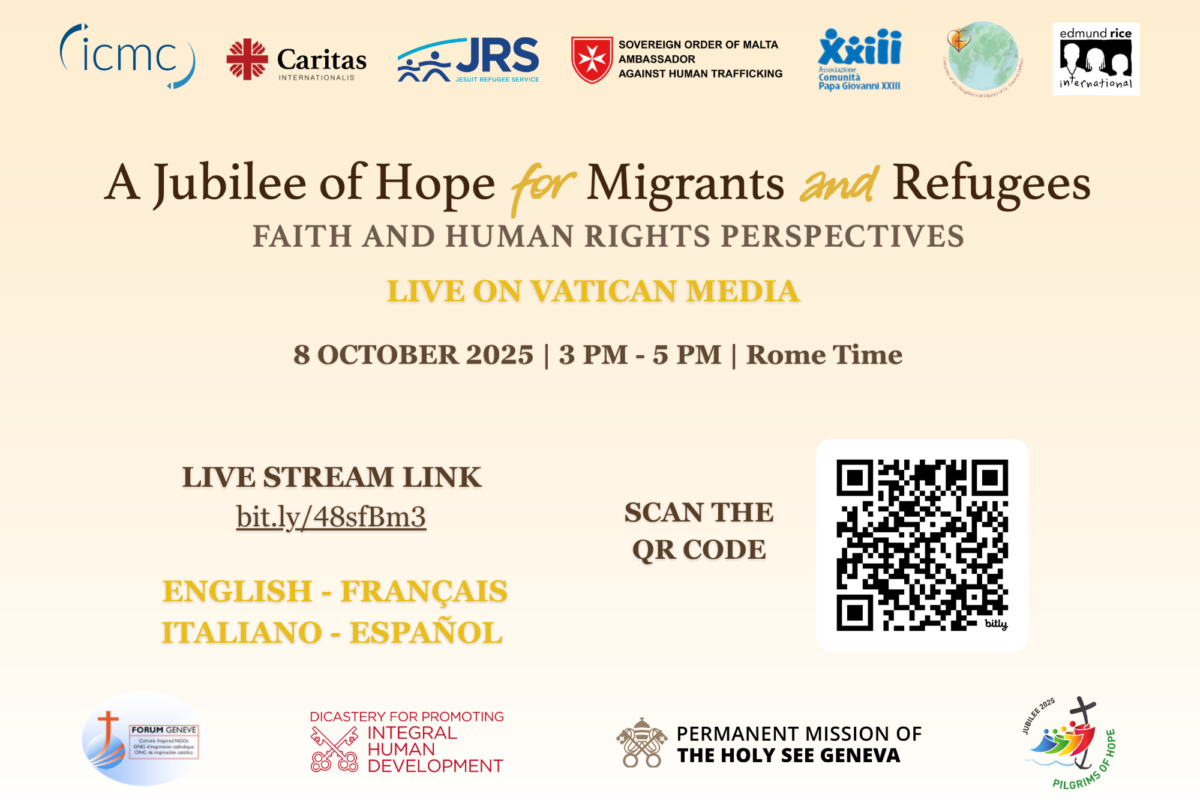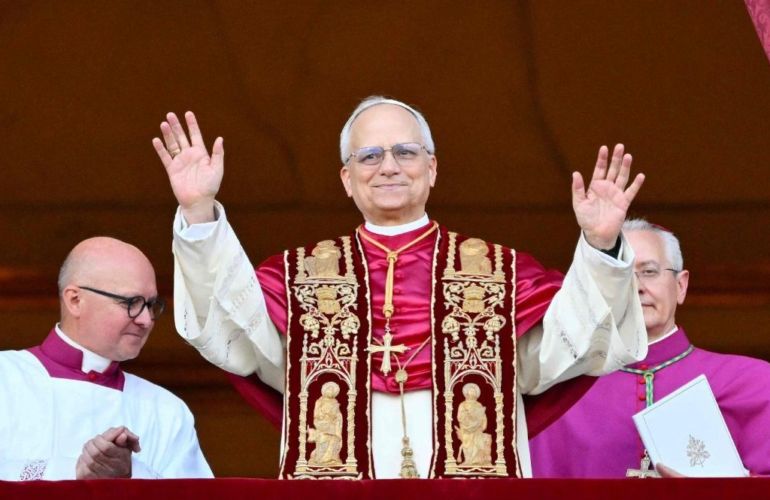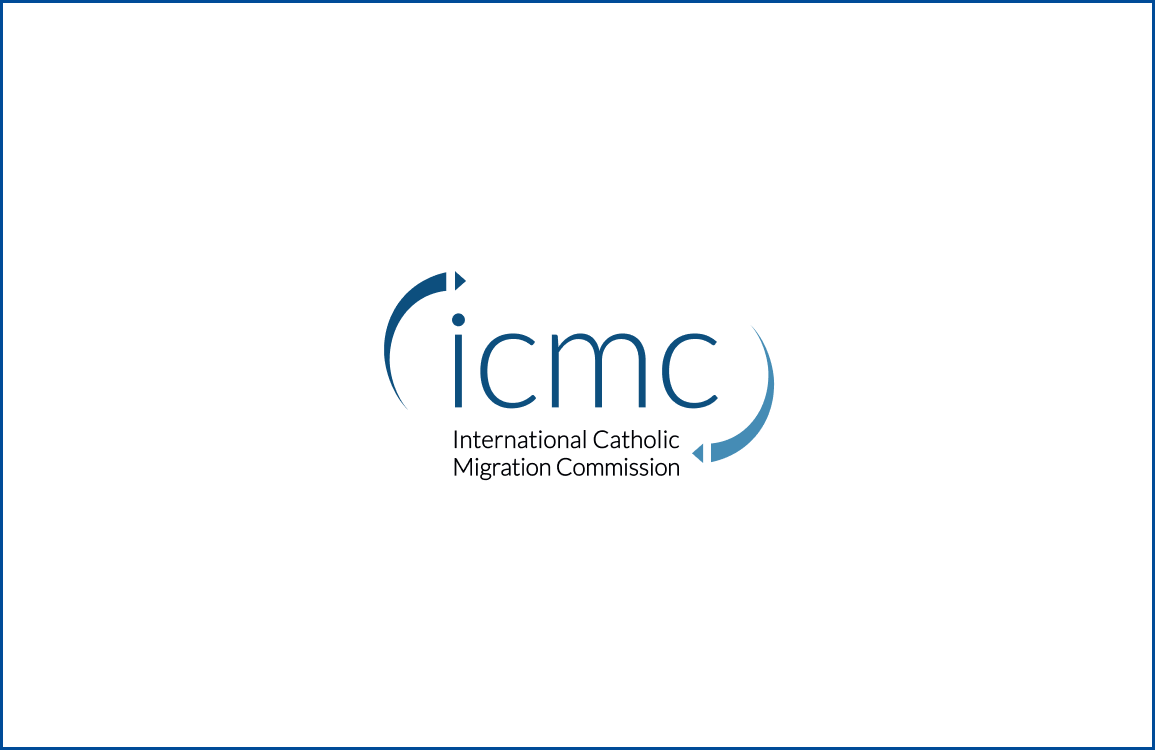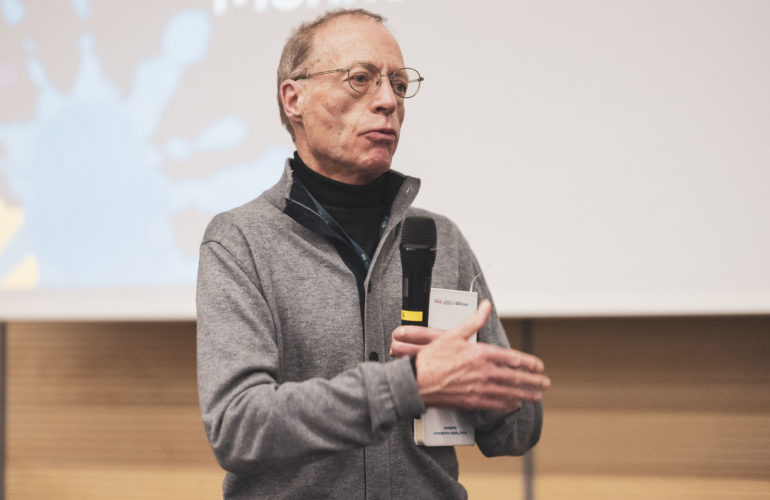ICMC Co-Organizes Webinar Reflecting on the Jubilee’s Message of Hope

On 8 October, the Geneva Forum of Catholic-Inspired Organizations brought together Church and international representatives to reflect on the Jubilee’s message in relation to current challenges for migrants and refugees
Organized by the Geneva Forum of Catholic-Inspired Organizations, on the initiative of ICMC, the 2-hour webinar was sponsored by the Vatican’s Dicastery for Promoting Integral Human Development, and broadcast via Vatican Media in English, French, and Spanish.
On 4-5 October 2025, thousands of pilgrims gathered in Rome to celebrate the Jubilee of the Missions and of Migrants. Jubilee celebrations focused on Pope Leo’s message of ’Migrants, missionaries of hope’, and his invitation to pilgrims and the Church to reflect on the connections between hope, migration and mission.
Responding to this invitation, the 8 October webinar ‘A Jubilee of Hope for Migrants and Refugees: Faith and Human Rights Perspectives’ brought together representatives from the Church, international organizations, faith-based organizations, and grassroots civil society to reflect on the Jubilee’s message in relation to the current challenges experienced by migrants, refugees, and those assisting them.
‘A moment of profound crisis’: The global context
The webinar took place at a critical moment time for the rights of migrants and refugees around the world.
“Today, we can find many reasons not to hope, but rather to despair”, reflected Cardinal Fabio Baggio, CS, Undersecretary of the Dicastery for Promoting Integral Human Development. “The numbers of people forcibly displaced by war and conflict continue to increase, alongside a decrease in co-responsibility in terms of taking care of their needs. We see new walls, barriers, and restrictive policies that increase irregular migration, and place ever more people at risk of exploitation, trafficking, and modern slavery.”
The ongoing global reduction in funding and resources for humanitarian and development assistance, including that for migrants and refugees, is part of wider erosion of international law and societal morality.
“This is not only a budget issue, but rather an attempt to bring about a fundamental shift in the system of the whole international community”, said ICMC Secretary General Mr. Davide Bernocchi. “The erosion of international law and global human rights is creating a profound moral crisis of our societies, in which the world increasingly resembles a jungle in which might – and wealth – make right.”
Finding hope: migrants, refugees, and people of goodwill
The Church’s teachings provide a basis on which to anchor hope and draw strength going forward.
“We are a pilgrim people, and so many Biblical stories confirm to us that migration is not a criminal act, but rather an integral part of our human history”, said Bishop Mark Seitz, Bishop of El Paso and Chairman of the Committee on Migration of the United States Conference of Catholic Bishops. “Caring for others, in particular the vulnerable, is fundamental to Christianity: the good Samaritan does not pass by he who is in need because he looks different.”
Hope is also drawn from the actions and commitment of the faithful, and those of people of goodwill around the world.
“We see a renewed engagement in the establishment of migrants desks and offices in many dioceses, which we at the Dicastery are accompanying, and so many young people who are interested and engaged in this cause,” stated Cardinal Baggio, CS. “There is a growing solidarity at the grassroots level, because it’s part of a human feeling and a desire to be part of a human family.”
Migrants and refugees themselves are agents of hope. “We are God’s creatures, and we come with hope because we have lost everything and started again,” stated Ms. Hala Al-Kayal, Syrian civil society activist and former refugee. “We are survivors, and when we are provided with a place to heal and feel safe, we can take our place within our new communities.”
Centering compassion, restoring dignity: the Church’s unique contribution
“Migrants and refugees are deprived of their rights by the situations that have been inflicted upon them,” stated Sister Olivia Umoh, DC, Director of Safe Child Advocacy and Coordinator of Talitha Kum Ghana. “By creating welcome, providing love, and treating people as human beings, they can become who they really are. It’s not about charity, but rather giving them back the dignity that has been stolen from them.”
This focus on the inalienable dignity of each person creates a unique capacity within the wider landscape of assistance for migrants and refugees. “Faith-based organizations provide not only assistance, but also moral leadership,” said Ms. Jackie Keegan, Deputy Director of the Division of International Protection at the U.N. Refugee Agency, UNHCR. “They remind us that compassion and dignity must guide or responses.”
Faith-based organizations also provide a unique capacity to reach populations in need. “Our position as trusted institutions of faith means we can do a lot with very little in terms of the numbers we reach,” explained Dr. Victor Genina, Director of Integral Human Development at Caritas Internationalis.
Pope Leo’s Jubilee message to pilgrims gathered in St Peter’s Square further reminded the faithful that the ‘seas and deserts’, or the places where the challenges faced by migrants, refugees, and our wider societies are experienced, are where God’s salvation is manifested.
“By recognizing migrants and refugees as human beings who are our brothers and sisters, and opening our arms with love, we are manifesting God’s salvation,” said Mr. Bernocchi. “As Catholic NGOs, we must join our efforts with the many people of goodwill around the world, both within and outside of the Church, to continue this mission with hope.”
Globally, the Church is making a difference. “We see this in both the scale and depth of assistance Catholic organizations and institutions are providing, and the crucial role that Catholic NGOs play in international and national advocacy,” stated Archbishop Ettore Balestrero, Permanent Observer of the Holy See to the United Nations and other Specialized Institutions in Geneva. “In this challenging global political and social context, we must bear witness to a world in which every person is seen and protected as a loved person of the human family. Keeping human dignity at the center of international and national policy processes, as Catholic organizations are doing here in Geneva, is our specific and unique contribution.”

Rachel Westerby
Independent writer and researcher on migration and refugees.



